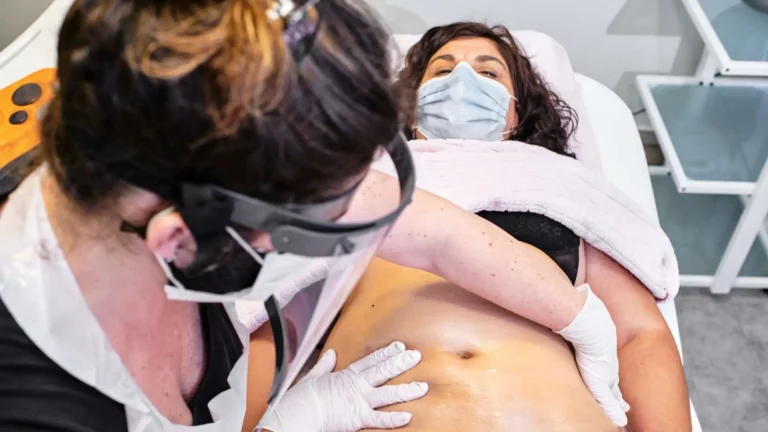Table of Contents
Liposuction is surgery that removes extra fat to reshape the body. It eliminates unwanted fat and enhances body shape. In 2021, over 491,000 procedures were done in the U.S., according to the National Library of Medicine. However, it can be expensive.
This raises a major question: Does health insurance cover liposuction? This article will discuss factors affecting insurance coverage, average costs, and tips to reduce financial strain.
Benefits of liposuction
Liposuction can offer nice cosmetic improvements and some health benefits too. It removes stubborn fat not lost through diet or exercise. The procedure targets the belly, underarms, and thighs. This can boost body image and self-confidence. Additionally, it enhances physical ability and reduces obesity-related risks by removing fat. These benefits last with a healthy diet.
Read Related Article: What is CYD in Health Insurance?
Overview of Health Insurance Coverage
Most insurance covers medical procedures deemed necessary. However, surgical liposuction is often considered cosmetic. Therefore, it’s rarely covered.
Yet, there are times when liposuction might be covered. For example, if a patient has lipomas or impairments, the procedure is necessary. So, they may be included in the insurance.
When does insurance cover liposuction?
Health insurance might cover it in certain situations. Here are some:
Medically Necessary vs. Cosmetic Procedures
The key factor is the procedure’s purpose and its medical aspect. Medically necessary means tests and treatments for an illness. They must be appropriate and related to the diagnosis. Health insurance usually covers these. Conversely, cosmetic procedures focus on reconstruction and have no medical need. Therefore, they aren’t covered by insurance.
Coverage for Specific Conditions
Liposuction may be performed to treat certain medical conditions like gynecomastia (excessive breast tissue development in men) or treatment of lipomas (fat tumors connected with skin frequently occurring in adults) due to functional reasons. If those conditions are painful or restrict movement, then part of this cost may be covered by insurance.
Factors Affecting Liposuction Coverage
A few things may affect coverage for medically necessary liposuction.
Read Related Article: Insurance Shopping: 5 Tips To Buy Right Term Plan
In-Network vs. Out-of-Network Providers
A surgeon’s network provider is key for liposuction coverage. In-network surgeons charge less due to insurance contracts. Out-of-network surgeons, however, lead to higher costs or no coverage. Yet, many patients forget to check this provider.
Copayments, Deductibles, and Coinsurance
Understanding these parts aids in planning expenses. Copayments are fixed fees for treatments and surgeries. Deductibles are what you pay before insurance starts. Coinsurance is your share after meeting the deductible, plus any copayment. Knowing these terms simplifies managing healthcare costs.
Typical Costs of Liposuction
It’s vital to understand the necessary financial implications. Here’s a summary of liposuction expenses:
Average Costs with Insurance
The price of surgery varies little by body part, surgeon, or location. However, insurance greatly reduces costs, especially for necessary procedures. On average, liposuction costs $4,711. The cost of this treatment will vary based on your insurance plan.

Out-Of-Pocket Expenses
Without insurance coverage, patients have to pay the entire amount for that operation. Not only the surgeon fees but also anesthesia, operating room fees, and aftercare are chargeable. Out-of-pocket costs can be considerable, making it very important for patients to look for different means of payment and check whether their coverage is sufficient for the operation before they go ahead with the surgery.
How to Verify Your Coverage
Before having liposuction, check your insurance policy and its provision for such a procedure. Here’s how:
Checking Your Insurance Policy
Check your insurance policy for coverage details. Ask about coverage for cosmetic and medically necessary surgeries. Policies usually outline covered treatments and conditions. This helps you see if liposuction is covered.
Read Related Article: Does Health Insurance Cover Tummy Tuck?
Contacting Your Insurance Provider
Contacting them helps you understand your liposuction coverage. This way, you can make informed healthcare decisions. Similarly, reaching out to companies also clarifies liposuction coverage. Thus, it aids in using healthcare options wisely.
Steps to Get Pre-Approved for Liposuction
If your insurer finds liposuction medically necessary, some steps can help ensure approval:
Pre-Authorization Requirements
Some insurance companies require pre-authorization. Patients must send their medical history or treatment plan for coverage. After this, every procedure needing reimbursement requires a follow-up. This check is done by either the patient or the doctor. It ensures proper documentation is received and coded.
Filing Claims Successfully
Work with your doctor’s office to ensure proper documentation and codes for the procedure. This will ensure the successful processing of insurance claims.
Tips for Reducing Liposuction Costs
Insurance companies will likely not cover cosmetic liposuction. However, there are options to lessen the cost.
Using In-Network Providers
Choosing a surgeon outside your insurance network can be costly. However, most insurers have contracts with specific providers, and these in-network providers offer lower prices to patients.
Exploring Financial Assistance Options
Some organizations or surgical practices may have offered financing to lower the cost of liposuction. These options will help you provide reasonable rates of liposuction through this avenue.
Read Related Article: How to Get a Free Tummy Tuck: Smart Tips
Conclusion
Although most insurance policies do not cover liposuction offered for aesthetic purposes, some policies embrace this procedure as part of certain medical insurance. Nevertheless, by examining your insurance policy in detail, calling your provider, or taking a combination of other steps, you will be better placed to utilize liposuction and its associated costs.
For those wanting health insurance with comprehensive care, turn to the online platform Beem. It lets you compare plans. Try Beem, to find the best coverage for your needs! Download the app here.
FAQs for Does Health Insurance Cover Liposuction
Is liposuction covered by health insurance?
Health insurance typically excludes liposuction, which is considered elective and cosmetic. Yet, if it’s needed for a medical condition, coverage might be available.
What should I do if my insurance doesn’t cover the full cost of liposuction?
If your insurance doesn’t cover the full cost, consider these options. Use in-network providers, explore financing, or discuss payment plans with your surgeon.
How can I find out if my insurance covers specific liposuction procedures?
If you want to undergo a particular liposuction treatment, discuss it with your medical insurance company regarding specific procedures and the treatment of disease states. Different products may have different purposes.














































